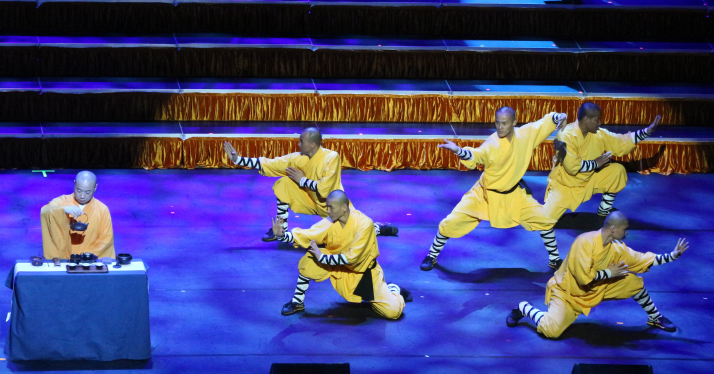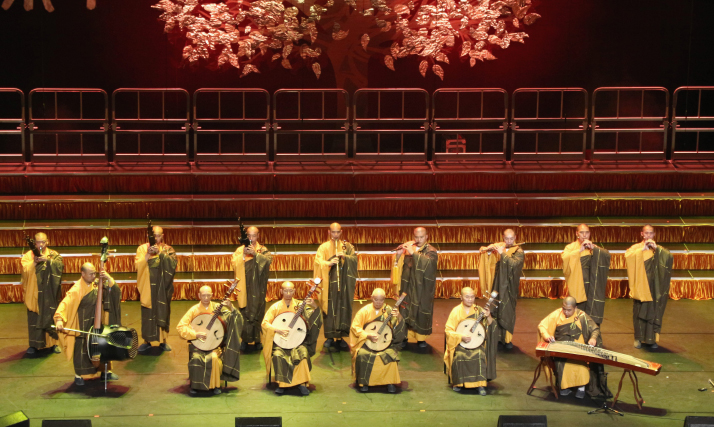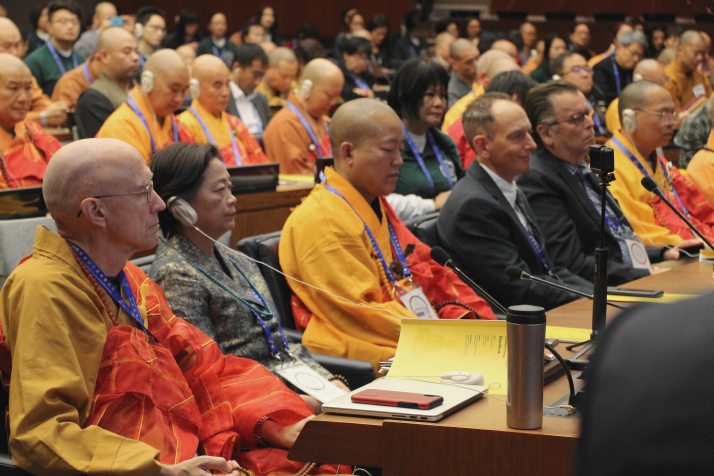| Lifestyle |
| Talking to the Mind | |
| UN-hosted Buddhism forum boosts cultural exchanges among China, the U.S. and Canada | |
|
|
 A kungfu and tea ceremony performance (ZHAO WEI)
In his past life Heng Sure was an Irish-Scottish actor doing Broadway musicals and going through a period of indecision about what to do in life. It was in the 1970s and the Viet Nam War was still raging and he was wondering if he should leave the United States for Canada. Then a visiting friend took him to a converted mattress factory to meet a man from northeastern China and as he described in a later interview, "The doubts and fears just drained out through my toes. And I distinctly heard a quiet voice say, 'You're back. Go to work. You're home'." That is how he met Hsuan Hua, the founder of the City of Ten Thousand Buddhas, a monastery in Talmage, California, and became a Buddhist, leaving his old life behind him. Heng Sure means "constantly real," which, he believes, is a reminder to him to go back to the truth, to what is genuine and real. On October 12, 12 days before the 72nd United Nations Day, the 69-year-old, who is now the managing director of the Berkeley Buddhist Monastery in California, came to the headquarters of the UN in New York to share his thoughts and the lessons he had learned from his teacher Hsuan Hua at the 2019 China-U.S.-Canada Buddhist Forum. Over 500 Buddhists, experts and scholars from the three countries came to promote exchanges and mutual learning. Heng Sure called Buddhism a very contemporary religion because "the issues that Buddhism addresses are the issues of the human mind and in our lives." He also called it a global religion because "it talks to the mind and the mind doesn't know east or west, male or female, young or old." Tradition and modernity Shi Dayi, Abbot of the Cham Shan Temple in Toronto, Canada, initiated the forum in 2017. "We can easily find obvious examples in both Buddhism doctrine and practice that illustrate the concepts advocated by modern civilized society, such as equality, fraternity, democracy and others," he said in a paper. With a history of over 2,500 years, Buddhism advocates compassion, equality and tolerance. It calls for following a balanced middle way and the path of peace. Yanjue, Vice President of the Buddhist Association of China, noted in his opening speech the UN's role in global governance and its upholding of all religions. "The purpose of the UN tallies with the common value and principle of all major world religions. Kofi Annan, former UN secretary general, once said that when major religious and spiritual leaders in the world join hands to call for world peace, it will bring about a vision for peace in the new millennium," he said. Holding the Buddhism forum at a time when the world is facing unprecedented changes is significant for furthering religious and cultural exchange and enhancing understanding, mutual trust and friendship between the people of the three countries, he added. It would also promote cultural exchange and mutual learning between the East and West and establish a community of common destiny. "Exchange and mutual learning between civilizations serve as the driving force for promoting progress of human society and peaceful development of the world," he said. "Distinctive and different as they are in forms, these cultures display equal and blended spiritual values that deserve respect and are embodied in the exchange between different civilizations."  Buddhist monk musicians play traditional Chinese instruments at Lincoln Center, New York City, on October 12 (ZHAO WEI)
Chan as bond The theme of the forum this year was the Spirit and Practice of Chan (meditation). Shi Dayi said Chan is not just for Buddhists, it transcends time, religions, races and nationalities. The teachings of the Southern School of Chan, propagated by many eminent monks in history, form the unique characteristics of the Chan School of Han Chinese Buddhism. The school, founded by the Sixth Patriarch of the Chinese Chan Buddhism Master Huineng (638-713), later spread to Japan, the Korean Peninsula and Viet Nam. When Japanese and Korean Buddhism masters launched dialogues between Chan and Western philosophies in the last century, Chan came into vogue among Americans. There are currently 3 million Buddhists in the United States, 1 percent of the total population. Mingyu, President of the American Buddhist Confederation and the Buddhist community of the U.S., said Han Chinese Chan Buddhism is "people-oriented, mind-focused," and its concepts are in line with the free and egalitarian American culture. This is why Han Chinese Chan Buddhism is spreading so rapidly among Americans, he said.  Participants at the 2019 China-U.S.-Canada Buddhist Forum in New York City (ZHAO WEI)
From Buddhism to culture Following the forum, the Chinese Buddhist Chanting Music Ensemble together with Shaolin Kungfu Monk Corps, the Lama Temple of Beijing (Yonghegong) and three other Buddhist temples in China staged two concerts themed Peace and Wellbeing at Lincoln Center, New York, on October 12-13. The concerts also included demonstrations of Shaolin kungfu, a renowned school of Chinese martial arts. With a history of 1,500 years, Shaolin kungfu combines Chan philosophy and martial arts that developed in the Shaolin Temple, a UNESCO World Heritage Site in Henan, central China. According to legend, Indian monk Bodhidharma (called Damo in Chinese) came to the Shaolin Temple in 527 and founded the school of Chan Buddhism. Shaolin kungfu became an important name card of China after the 1982 martial arts film Shaolin Temple, based on the legend of the Shaolin kungfu monk and starring martial art champion Jet Li. The film not only launched Jet Li's illustrious film career but also generated global publicity for the Shaolin Temple and Shaolin kungfu. Since then, the Shaolin Kungfu Monk Corps has been invited to perform authentic Shaolin kungfu in over 60 regions and countries. Kate Valk, a New Yorker who came to the concert with her friend, said it was an amazing performance. "This was my first Buddhist chant event," she said. "The vocals and martial arts were fantastic. I've seen a lot of Chinese martial arts used in the Chinese Opera, but never anything like that. When people share their culture, music and dance and theater, there's no problem." (Reporting from New York City, the U.S.) Copyedited by Sudeshna Sarkar Comments to zhaowei@bjreview.com |
|
||||||||||||||||||||||||||||
|